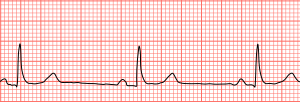
English
Sign In
Bradycardia

Bradycardia is a condition typically defined wherein an individual has a resting heart rate of under 60 beats per minute (BPM) in adults. Bradycardia typically does not cause symptoms until the rate drops below 50 BPM. When symptomatic, it may cause fatigue, weakness, dizziness, sweating, and at very low rates, fainting. During sleep, a slow heartbeat with rates around 40–50 BPM is common, and is considered normal. Highly trained athletes may also have athletic heart syndrome, a very slow resting heart rate that occurs as a sport adaptation and helps prevent tachycardia during training.

Parent Topic
Child Topic
No Parent Topic